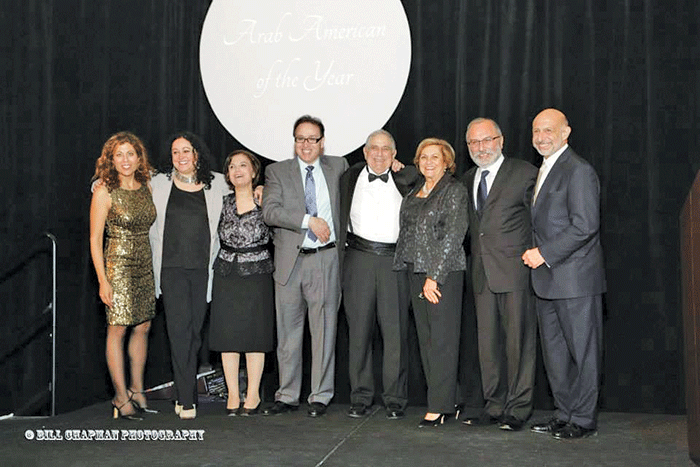
DETROIT — ACCESS honored Drs. Jack Shaheen and Khaled Mattawa with the “Arab American of the Year” Award at its 44th Annual Dinner on Saturday, April 25. Community members, activists and elected officials attended the dinner at the Renaissance Center.
Mattawa is a renowned poet and academic who received the MacArthur Foundation “Genius Grant” last year for translating Arabic poetry into English. Shaheen is a well-respected author who wrote several books documenting negative stereotypes about Arabs in American media.
Governor Snyder sent a video message praising ACCESS for its contributions and congratulating the honorees.
“As governor, I recognize the importance of ACCESS, the largest Arab American nonprofit in the country,” Snyder said.
The ceremony started with a performance by Detroit’s Second Ebenezer Church Majestic Voices Choir, who sang “Glory” from the movie “Selma” as tribute to the Take on Hate and #BlackLivesMatter campaigns.
Mayor Mike Duggan, who commended ACCESS for its services, said he started his own anti-bigotry campaign when he ran for office two years ago.
Duggan said some people told him he had no chance of being elected mayor in the predominantly African American city because of racial distrust.
“I said to Detroiters in every part of the city, ‘If you vote for me, you are making a decision that you are going to live in a city where it is no longer going to matter if you are Black, Brown or White; it’s no longer going to matter if you are Christian, Jewish or Muslim; it’s no longer going to matter if you were born in the city of Detroit or you are an immigrant from another country,” he said. “We’re going to build a city where everybody is welcomed; everybody is included and everybody is valued.”
Duggan said he is proud to welcome ACCESS into Detroit as the first mayor who had been a board member of the organization.
Dearborn Mayor Jack O’Reilly Jr., who is also a former board member of ACCESS, paid tribute to the organization’s growth.
The Dearborn mayor said ACCESS was founded to help immigrants succeed, but it continued to evolve and now the nonprofit aids people of all backgrounds. “They never stop growing.”
Mattawa said he is glad to be honored with Shaheen, the author of the iconic book “Reel Bad Arabs: How Hollywood Vilifies a People.”
He also said his work complements Shaheen’s.
“I work on the good, and he works on the bad and the ugly,” Mattawa said. “I work on poetry and he tries to deal with the ugly side of cultural politics.”
The Libyan American poet said in his early exposure to poetry, he came across Robert Frost’s definition of home as “the place where they do not ask you why you’ve come.” However, he found that definition narrow.
“As an Arab, the definition of home is where they ask you where have you been all this time,” Mattawa continued. “Where they ask you what are you after; and before you answer, they say, here’s what you have to do.”
Mattawa, who teaches creative writing at the University of Michigan, said he lived by Frost’s definition of home from the time he immigrated to the United States until he came to Dearborn and became involved with ACCESS and the Arab American community. That’s when he rediscovered the Arab sense of home.
“Even the word Dearborn has an Arab flare in it,” he said. “Now when we come to Dearborn, my family and I, we come for that feeling.”
Shaheen was introduced by his daughter, Michele Tasoff, who has been a producer on NBC’s “The Tonight Show” for 17 years. Tasoff was moved to tears when she described her father’s struggle to get his research on Arabs and Muslim stereotypes in the media published.
Shaheen recalled his first trip to his family’s hometown in Lebanon. He arrived late to the village and the only cousin who spoke English was not around. Surrounded by family members, he decided to speak out all the Arabic words he knew— names of Lebanese dishes. The next day, he woke up to find his relatives and their neighbors preparing kebbi, koussa, mashawi and all the foods he had named the previous night.
He also spoke about the beginnings of his research into negative portrayals of Arabs and Muslims in the media, which was sparked by his daughter alerting him to “bad Arabs” on television.
After the “bad Arabs” encounter, Shaheen won a Fulbright Scholarship to teach at the American University of Beirut, where he wrote his first essay and gave his first speech on the subject in 1975.
“I’m often asked, ‘How can you defend Islam? You’re not a Muslim,'” Shaheen said. “There is a great memorial down here at the riverfront for the Underground Railroad. How could a White person help a Black person escape slavery if they weren’t Black? Isn’t is the duty of every man, woman and child to help somebody else?”






Leave a Reply